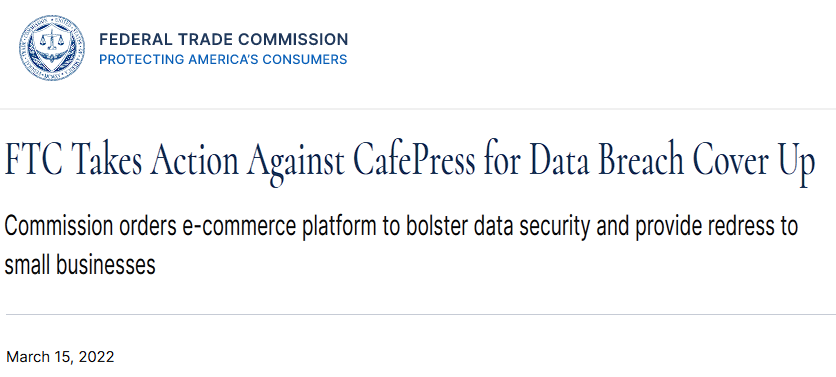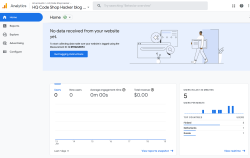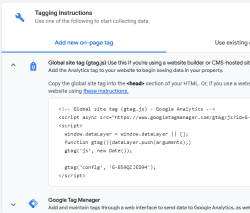FTC-case: Cafepress leak
Thursday, June 30. 2022
Couple days ago I got an email to a really old address of mine. I happen to own number of domains and most of them are connected to the mail system on my home Linux server. Many many years ago I stopped using a single email address for the simple reason that I couldn't identify to whom I had given that address to. This is a design flaw in archaic asynchronous messging methods like snail mail, telephone calls or SMTP. You simply don't know who is contacting you and where did they obtain your information from.
To defeat this design flaw I have an unique email address for every single service I ever hand my information to. That particular address in question pre-dates my system and is roughly 20 years old. So, no way of knowing who originally leaked it or how many times the address has been leaked. As I don't use it anywhere anymore, an email sent there is with 99,9% confidence junk.
Why I'm writing about that email is obvious, it had very interesting content. Sender claimed to be (a company?) called CafePress. Something I've never head of. Another reason why I kept investigating this maybe-spam was the subject of "Notice of FTC Settlement - 2019 Data Breach". Ok. Federal Trade Commission of USA was addressing me via CafePress. Really interesting!
First the technical ones. To deduce if this was spam or not, I always check the mail headers. This baby had both SPF and DKIM verified correctly. Both technical measures are pretty much a must for anybody to accept the incoming set of bytes. Well, also spammers know this and typically use Google or Microsoft as spam platforms via their free-of-charge mail offerings.
As technical details checked out, next the actual sending server. It originated to something called https://www.sparkpost.com/. Again, something I've never heard of. Ultimately this mail passed all techical checks. My thinking started leaning towards this being the Real Deal.
Email contents:
Dear Valued Customer,
We are contacting you about the 2019 breach of your information collected by the prior owners of CafePress. This notice is about that breach, which you may have already been notified of.
We recently reached a settlement with the Federal Trade Commission, the nation's consumer protection agency, to resolve issues related to the 2019 data breach, and to make sure CafePress keeps your information safe. What happened?
Before November 2019, CafePress didn't have reasonable practices to keep your information safe. When the company had a security breach, the following information about you may have been stolen: your email address, password, name, address, phone number, answers to your security questions, and the expiration date and last four digits of your credit card.
What you can do to protect yourself
Here are some steps to reduce the risk of identity theft and protect your information online:
<blah blah removed>
Sincerely,
Chris Klingebiel
General Manager, CafePress
Hm. Interesting.
Somebody in a company I've never heard of leaked my data in 2019 by a hack. Well, why did they have my information on the first place!
Googling the topic for more details:

Article Commission orders e-commerce platform to bolster data security and provide redress to small businesses is available on FTC.gov. It was legit after all!
Press release mentionded following: "Residual Pumpkin Entity, LLC, the former owner of CafePress, and PlanetArt, LLC, which bought CafePress in 2020". Whoa! Even more companies which I never heard of.
Some highlights:
According to the complaint, a hacker exploited the company’s security failures in February 2019 to access millions of email addresses and passwords with weak encryption; millions of unencrypted names, physical addresses, and security questions and answers; more than 180,000 unencrypted Social Security numbers; and tens of thousands of partial payment card numbers and expiration dates.
Obviously this CafePress (or whoever it is) didn't do much of a job for protecting their stolen/bought/downloaded-from-DarkNet -data. It's a good thing FTC gave them a slap-on-the-wrist -punishment as the company is clearly crooked. Why an earth didn't FTC do more follow up on the origins of the data? I'd definitely love to hear how this CafePress got my data into their hands. I didn't volunteer it, that's for sure!
Really puzzling case this. I suppose it speaks volumes about the modern state of Internet.
Breaking the paywall - Follow up
Wednesday, June 22. 2022
Back-in-the-day, roughly three years ago, I wrote a JavaScriptlet for breaking trough a press website's paywall. At the time I promised not to "piss" into their proverbial coffee pot and not publish updated versions of my hack. I kept my word. It was surprisingly easy! They didn't change a thing. Until now.
This particular ICT-media finally realized their client tell to contain mostly smart people with good computer skills. Just clicking a button on your shortcuts-bar of your chosen web browser after reading 5 articles was too easy. They finally went into full-blown hedgehog defense and enabled two measures:
- Without authentication, your IPv4-address is tracked.
- No cookies required
- Doesn't care which browser on which computer you're using
- There is a very small number of free-of-charge articles you can read per day. I'd say 5.
- Unfortunately their AWS-setup doesn't have IPv6 enabled. With that I'd have much more IP-addresses at my disposal.

- With authentication, the number of free-of-charge articles is limited. I'd guess to 10 of them.
For proper paywall breakage, lots of IPv4-addresses would be required. I do have some, but I'd rather not play this game anymore. I'll call it quits and stick with the headers of their RSS-feed. Obviously, they'll limit the feed into last 10 articles, but if you keep reading and accumulating the data 24/7, you'll get all of them.
Good job! One potential customer lost.
Google Analytics 4 migration
Monday, June 20. 2022
For number of reasons, instead of migration, I should write migraine. First is about moving from an old system into a new one. Latter is about medical condition causing severe headaches. In this case, there seems to be not much of a difference.
Google's own Make the switch to Google Analytics 4 -migration guide has 12 steps. Given complexity, the time I have to invest on this and lack of really diving into this, I probably missed most of them.
Going into GA4-console, I have this:

Clicking on Get Tagging Instructions, I'll get further information:

There is a snippet of JavaScript, which I can inject into this site.
<script async="" src="https://www.googletagmanager.com/gtag/js?id=G-859QZJED94"></script>
<script>
window.dataLayer = window.dataLayer || [];
function gtag(){dataLayer.push(arguments);}
gtag('js', new Date());
gtag('config', 'G-859QZJED94');
</script>
Note: My GA4-stream ID is G-859QZJED94. Make sure to use yours, not mine. As the stream ID cannot be a secret, it's ok to publish it here. The same ID can be found from HTML-code of this page.
To verify installation success, I went to GA4 portal, chose Reports and Realtime. It didn't take long, less than a minute, for that report to indicate user activity. Many other places keep saying "No data received from your website yet", "No data received in past 48 hours" or "Data collection isn’t active for your website". IMHO all of those are incorrect, as I do have stats. We'll see if I managed to do that right.

